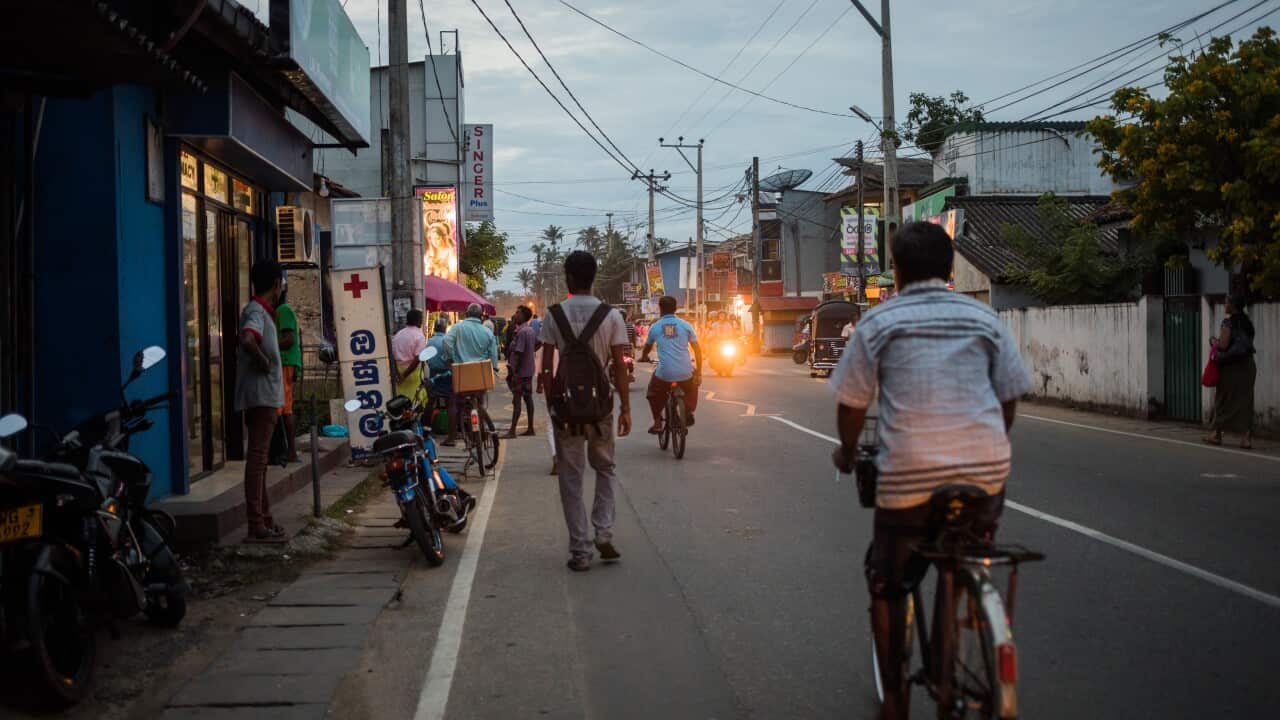Sri Lankans living in Australia have watched in shock for months as the country’s economic crisis worsened, until last weekend it became too much to bear.
The movement of “Aragalaya” - Sinhalese for struggle - culminated in Colombo protesters storming the presidential palace and ousting the Rajapaksa family - including - from power. Many in the Sri Lankan diaspora say the reckoning has been a long time coming.
"They never thought [they’d face an uprising], but we have foreseen that,” Sinhalese Cultural Forum president Nihal Rupasinghe told SBS News.
“People have no choice, when the day-to-day routine is disturbed, what else [have] they got to do?”
“They have lost the confidence of diaspora themselves living outside because the government is not transparent and credible.”
For months, the community has heard the stories of hardship first-hand from friends and relatives through messages and photos shared over the instant messaging service WhatsApp - when the internet and power have been online.
“From the outside, it's very hard to see what's happening there, people are on the streets, no food, no fuel,” Mr Rupasinghe said.
“No one will ever wish to bring their country, a prosperous country, a beautiful country to that level ... on their knees.”
Members of the diaspora living in Australia are well aware there is no quick fix to the nation’s economic quagmire.
The impact of COVID-19 and a range of policies implemented by the Rajapaksa government have seen the nation’s economy collapse and cash reserves exhausted.
And so with the government in turmoil, the community has taken it on themselves to secure the supplies of vital necessities, like medicines, for their homeland.
Mohan Seneviratne visited the country in February when power blackouts were becoming common and supermarket shelves were becoming bare.

Mohan Seneviratne from Save A Dream. Credit: SBS: Naveen Razik
"Because Sri Lankan healthcare is free of charge, lack of revenue and lack of foreign exchange resulted in no medicines, even microscope slides," he said.
"I would take this opportunity to urge the Sri Lankan diaspora and those friends of Sri Lanka to open their wallets and contribute, donate whatever because the situation is so very, very dire."
He fears it will take up to a decade for the nation to fully recover.
Sending medicines overseas has been a new challenge for many groups. Mohan Nanayakkara is a long-time member of the Sydney Sri Lankan Lions Club and admits there have been many “oil burnings nights” trying to sort through the logistical challenges presented by Sri Lanka’s dire situation.
“During the COVID, we provided equipment to help people to … over twenty hospitals and we sourced it in Australia,” he said.
“It was a great learning experience, which we can use now, but the situation is extremely difficult compared to then, because the stocks are not available.”

People wait to buy kerosene at a gas station amid a fuel shortage in Colombo, Sri Lanka, 11 April 2022. Source: EPA / CHAMILA KARUNARATHNE/EPA
“In such a resourceful country, it takes a lot of effort to put such a country in this situation,” he told SBS News.
“[But] the other resource we have is the supportive community and the diaspora. Every one of us needs to support the country out of the situation.”
Tamil-Australians sceptical of justice
In addition to overseeing an economic catastrophe, the Rajapaksas have long stood accused of persecuting minorities, inflaming tensions between the majority Sinhalese and minority Tamil and Muslim groups.
In 2009, with Mahinda Rajapaksa as president and Mr Rajapaksa as defence minister, the Sri Lankan military oversaw the country's 25-year civil war against the Tamil Tigers separatist group coming to a bloody end.
A UN panel has also found credible evidence of war crimes committed under their rule, with reportedly 40,000 Tamil civilians killed in those final offensives - many of them the victims of indiscriminate shelling.
While the Rajapaksas have now been ousted, Tamils living in Australia remain apprehensive about the nation's future.
Those expected to replace Mr Rajapaksa as president are all members of Sri Lanka's political establishment - which is predominantly composed of Sinhalese Sri Lankans.
"Whilst there's an aspect of the family being gone, their ideology is still steeped into the Sri Lankan systems,” Tamil-Australian Renuga Inpakumar said.
“While the Rajapaksas are gone, I think the Tamils know that the fight will be harder, whoever will be in power."

Dr Niro Kandasamy and Renuga Inpakumar from the Tamil Refugee Council.
Dr Niro Kandasamy is a member of the Tamil Refugee Council, which has helped assist asylum seekers who have left Sri Lanka, many of whom faced persecution and torture under Rajapaksa rule.
"I think that what's needed is deep structural reform. And we're not seeing some of those demands in the protests that are taking place at the moment,” she said.
“The resignation of Gotabaya Rajapaksa is obviously significant. But we also want to make sure that the next government, whoever that is, listens to the needs and the aspirations, the political aspirations of minority Tamil communities."












